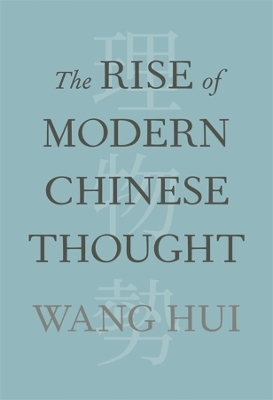
The Rise of Modern Chinese Thought
Seiten
2023
Harvard University Press (Verlag)
978-0-674-04676-4 (ISBN)
Harvard University Press (Verlag)
978-0-674-04676-4 (ISBN)
Wang Hui asks what it means for China to be modern and for modernity to be Chinese. Is there a rupture between tradition and modernity in China? How has Confucian thought evolved? Did China become modern in the Middle Ages? A deep intellectual history, The Rise of Modern Chinese Thought revises our senses of both modernity and Chinese philosophy.
"Brilliantly reveals a China that has always been lively and pluralist in its political thought...His analysis has immense relevance for China today."
–Rana Mitter, Foreign Affairs
The definitive history of China’s philosophical confrontation with modernity, available for the first time in English.
What does it mean for China to be modern, or for modernity to be Chinese? How is the notion of historical rupture—a fundamental distinction between tradition and modernity—compatible or not with the history of Chinese thought?
These questions animate The Rise of Modern Chinese Thought, a sprawling intellectual history considered one of the most significant achievements of modern Chinese scholarship, available here in English for the first time. Wang Hui traces the seventh-century origins of three key ideas—“principle” (li), “things” (wu), and “propensity” (shi)—and analyzes their continual evolution up to the beginning of the twentieth century. Confucian scholars grappled with the problem of linking transcendental law to the material world, thought to action—a goal that Wang argues became outdated as China’s socioeconomic conditions were radically transformed during the Song Dynasty. Wang shows how the epistemic shifts of that time period produced a new intellectual framework that has proven both durable and malleable, influencing generations of philosophers and even China’s transformation from empire to nation-state in the early twentieth century. In a new preface, Wang also reflects on responses to his book since its original publication in Chinese.
With theoretical rigor and uncommon insight into the roots of contemporary political commitments, Wang delivers a masterpiece of scholarship that is overdue in translation. Through deep readings of key figures and classical texts, The Rise of Modern Chinese Thought provides an account of Chinese philosophy and history that will transform our understanding of the modern not only in China but around the world.
"Brilliantly reveals a China that has always been lively and pluralist in its political thought...His analysis has immense relevance for China today."
–Rana Mitter, Foreign Affairs
The definitive history of China’s philosophical confrontation with modernity, available for the first time in English.
What does it mean for China to be modern, or for modernity to be Chinese? How is the notion of historical rupture—a fundamental distinction between tradition and modernity—compatible or not with the history of Chinese thought?
These questions animate The Rise of Modern Chinese Thought, a sprawling intellectual history considered one of the most significant achievements of modern Chinese scholarship, available here in English for the first time. Wang Hui traces the seventh-century origins of three key ideas—“principle” (li), “things” (wu), and “propensity” (shi)—and analyzes their continual evolution up to the beginning of the twentieth century. Confucian scholars grappled with the problem of linking transcendental law to the material world, thought to action—a goal that Wang argues became outdated as China’s socioeconomic conditions were radically transformed during the Song Dynasty. Wang shows how the epistemic shifts of that time period produced a new intellectual framework that has proven both durable and malleable, influencing generations of philosophers and even China’s transformation from empire to nation-state in the early twentieth century. In a new preface, Wang also reflects on responses to his book since its original publication in Chinese.
With theoretical rigor and uncommon insight into the roots of contemporary political commitments, Wang delivers a masterpiece of scholarship that is overdue in translation. Through deep readings of key figures and classical texts, The Rise of Modern Chinese Thought provides an account of Chinese philosophy and history that will transform our understanding of the modern not only in China but around the world.
Wang Hui is Distinguished Professor of Literature and History at Tsinghua University and founding Director of the Tsinghua Institute for Advanced Study in Humanities and Social Sciences. His books include China’s Twentieth Century, China from Empire to Nation-State, The Politics of Imagining Asia, and China’s New Order. Michael Gibbs Hill is Associate Professor of Chinese Studies at William & Mary and author of Lin Shu, Inc.: Translation and the Making of Modern Chinese Culture.
| Erscheinungsdatum | 10.07.2023 |
|---|---|
| Verlagsort | Cambridge, Mass |
| Sprache | englisch |
| Maße | 156 x 235 mm |
| Gewicht | 1474 g |
| Themenwelt | Geisteswissenschaften ► Geschichte ► Regional- / Ländergeschichte |
| Geisteswissenschaften ► Philosophie ► Östliche Philosophie | |
| Sozialwissenschaften ► Ethnologie | |
| Sozialwissenschaften ► Politik / Verwaltung | |
| Sozialwissenschaften ► Soziologie | |
| ISBN-10 | 0-674-04676-5 / 0674046765 |
| ISBN-13 | 978-0-674-04676-4 / 9780674046764 |
| Zustand | Neuware |
| Informationen gemäß Produktsicherheitsverordnung (GPSR) | |
| Haben Sie eine Frage zum Produkt? |
Mehr entdecken
aus dem Bereich
aus dem Bereich
Erinnerungen
Buch | Softcover (2024)
Pantheon (Verlag)
CHF 22,40


